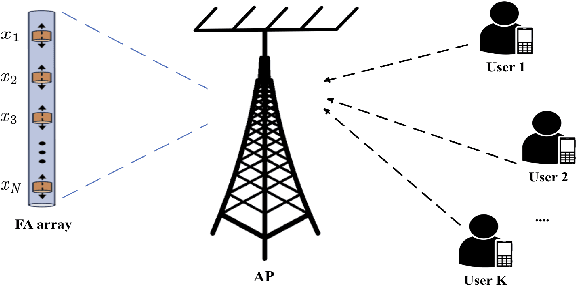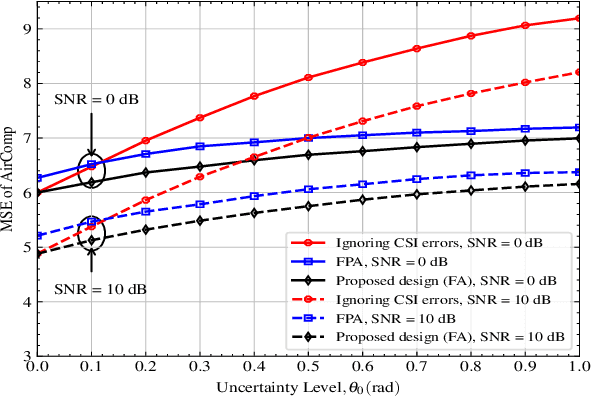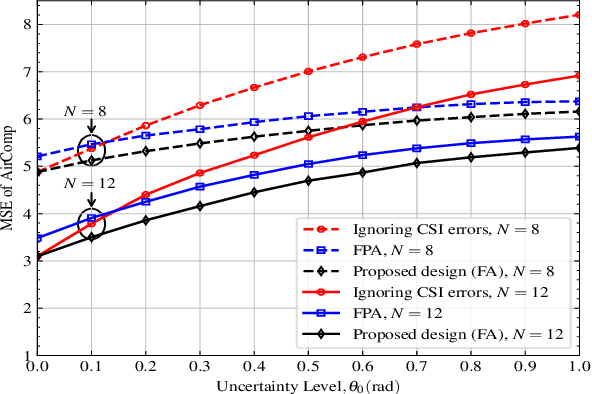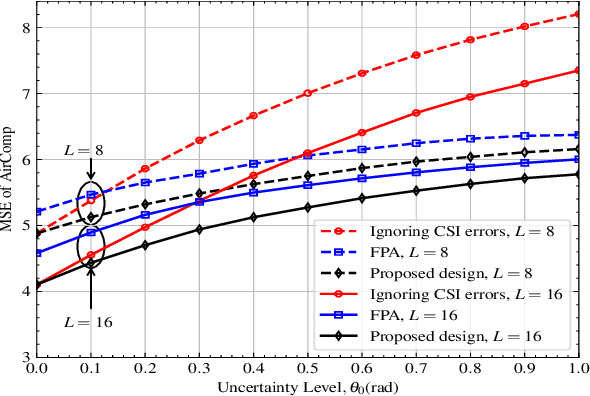Ghosheh Abed Hodtani
Robust Resource Allocation for Over-the-Air Computation Networks with Fluid Antenna Array
Apr 22, 2025



Abstract:Fluid antenna (FA) array is envisioned as a promising technology for next-generation communication systems, owing to its ability to dynamically control the antenna locations. In this paper, we apply FA array to boost the performance of over-the-air computation networks. Given that channel uncertainty will impact negatively not only the beamforming design but also the antenna location optimization, robust resource allocation is performed to minimize the mean squared error of transmitted messages. Block coordinate descent is adopted to decompose the formulated non-convex problem into three subproblems, which are iteratively solved until convergence. Numerical results show the benefits of FA array and the necessity of robust resource allocation under channel uncertainty.
Enhancement of Over-the-Air Federated Learning by Using AI-based Fluid Antenna System
Jul 03, 2024
Abstract:This letter investigates an over-the-air federated learning (OTA-FL) system that employs fluid antennas (FAs) at the access point (AP) to enhance learning performance by leveraging the additional degrees of freedom provided by antenna mobility. First, we analyze the convergence of the OTA-FL system and derive the optimality gap to illustrate the influence of FAs on learning performance. Then, we formulate a nonconvex optimization problem to minimize the optimality gap by jointly optimizing the positions of the FAs and the beamforming vector. To address the dynamic environment, we cast this optimization problem as a Markov decision process (MDP) and propose the recurrent deep deterministic policy gradient (RDPG) algorithm. Finally, extensive simulations show that the FA-assisted OTA-FL system outperforms systems with fixed-position antennas and that the RDPG algorithm surpasses the existing methods.
Channel Parameter Estimation in the Presence of Phase Noise Based on Maximum Correntropy Criterion
Dec 15, 2021



Abstract:Oscillator output generally has phase noise causing the output power spectral density (PSD) to disperse around a Dirac delta function. In this paper, the AWGN channel is considered, where the sent signal accompanying with phase noise is added to the channel Gaussian noise and received at the receiver. Conventional channel estimation algorithms such as least mean square (LMS) and mean MSE criterion are not suitable for this channel estimation. We (i) analyze this phase noise channel estimation with information theoretic learning (ITL) criterion, i.e., maximum correntropy criterion (MCC), leading to robustness in the channel estimator's steady state behavior; and (ii) improve the convergence rate by combining MSE and MCC as a novel mixed-LMS algorithm.
 Add to Chrome
Add to Chrome Add to Firefox
Add to Firefox Add to Edge
Add to Edge